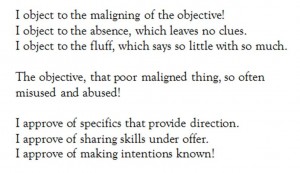A resume reader laments…

Clearly, becoming a poet is not in my future. I do, however, passionately feel the intention behind the poem. As a frequent reader of resumes, I often struggle to figure out what the writer is after. I can make an educated guess, and it’s my job as a career advisor to help students figure things like that out. But other resume readers? They don’t have the time. The job-seeker needs to make it crystal clear what they’re after. An objective is an easy way to do just that.
The problem with most objectives is that they’re often badly written. An example of the cringe-worthy:
- Objective: A dynamic position that will allow me to use my skills and grow with the company
Any clue what that might be? Me either. A bit more clarity is helpful. This is better:
- Objective: An entry-level administrative role within an arts organization
Specific, yet still broad enough to encompass many organizations, this version can be effective when giving the same resume to multiple people, such as a career fair or when networking. The objective’s purpose is to provide a basic filter for reviewing the resume, and can help make seemingly disparate experiences connect into a coherent message.
When applying for an open position more specificity is called for:
- Objective: Seeking a position as Program Assistant I with the Seattle Cancer Care Alliance
There’s nothing like being up front about what you’re after.
Using an objective is completely optional. In some instances it might be extraneous, such as submitting applications through an online system (where it’s obvious which position it connects to). For entry-level applicants whose skills come from a wide range of not-necessarily-obvious experiences, the objective can provide some clarity and focus.
© 2011 Career and Employment Services, University of Puget Sound
Poem and photo: Sue Dahlin